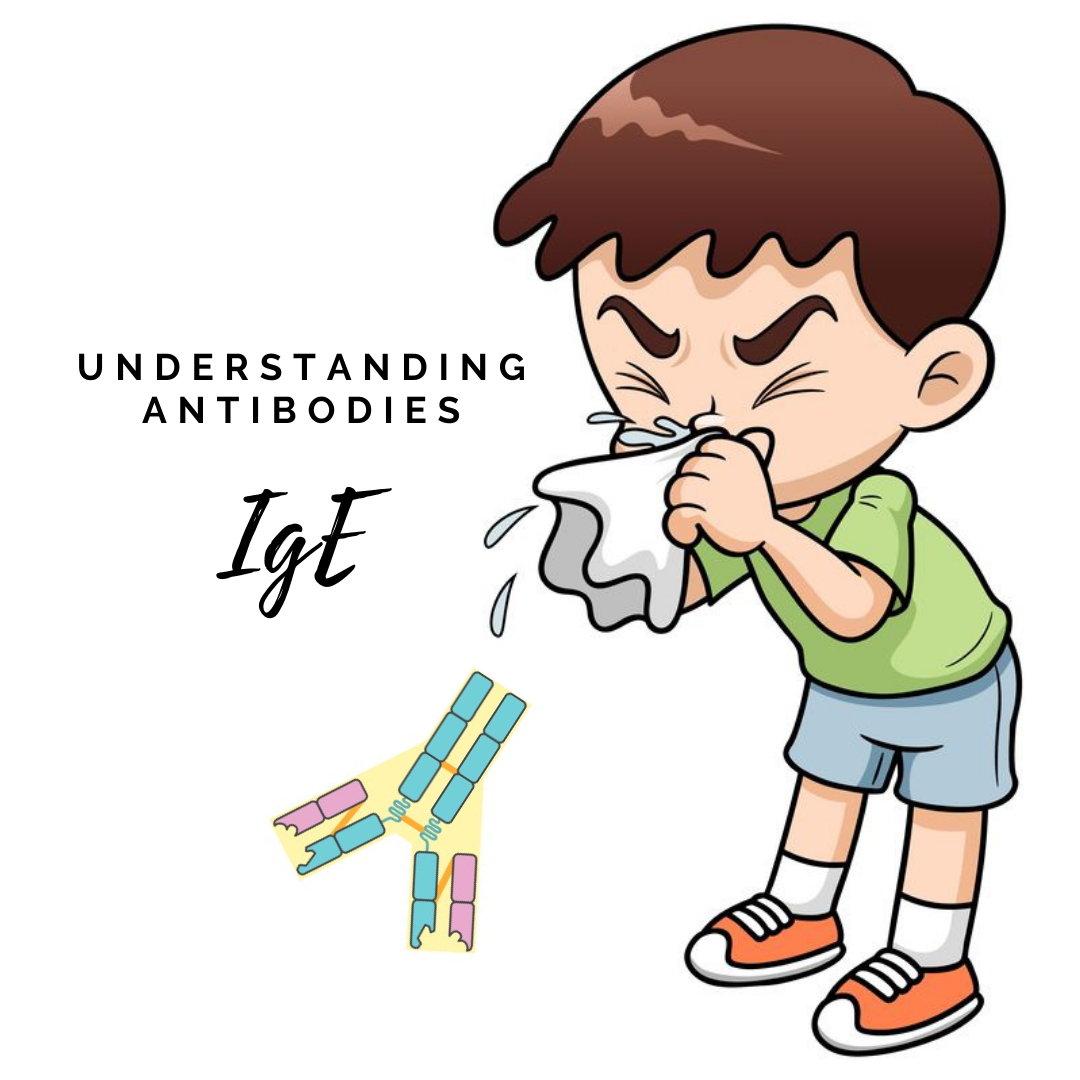Understanding Antibodies: IgE

This article on IgE is part 4 of 4 of our Understanding Antibodies segment. See our previous blog posts on IgM, IgG and IgA antibodies if you are just catching up!
Immune System Fast Responders
Of all the antibodies, IgE antibodies are probably the most well know. This is because they are the tanks of the immune system. They come in hard and fast. They are also associated with histamine reactions and are usually the antibodies responsible for severe allergy reactions.
When we talk about true allergies – we are talking about IgE antibodies. IgE reactions cause our more typical allergic reactions like sneezing, food allergies, and skin reactions.
While IgE reactions can cause fatal reactions (anaphylaxis) in some, our understanding of why humans have developed this reaction is limited. IgE reactions recently have been shown to be effective against some parasite infections. Additionally, there is some evidence to suggest that the fast action of IgE reactions evolved as a way for humans to combat venom or poison in the blood.
Having these fast reactors may be helpful for some very acute infections or reactions. But ultimately, IgE reactions can cause significant reactions that can prove to be annoying, or in worse cases, detrimental to some.
Types of Antibodies: IgE
IgE antibodies account for the smallest level of antibody present in our blood. They represent < 1% of all antibodies in the blood. But they are the most powerful of all of the antibody reactions. And these reactions can occur anywhere: in the skin, airways, gut, nose…etc.
IgE reactions are considered acute phase allergies. They usually flare up within minutes to hours after exposure to a trigger. (Unlike IgG reactions which can take hours to days to flare). IgE stimulates a powerful portion of the immune system called mast cells, which release histamine. Histamine is a chemical that causes swelling, itching and redness. If histamine is produced in the airway, swelling can lead to airway constriction, which can lead to asthma or inability to get oxygen to the lungs.
Because these reactions are so fast acting and so strong, they can produce a wide range of symptoms depending on where they are. IgE reactions could be as small as an itchy nose, to as severe as airway constriction. If we were to stick with my Umbrella Academy reference (I can’t let this one go), IgE’s would be considered the Number 6 of the family – Ben Hargreeves. In the story, #6 can channel an energy that is so powerful and causes so much destruction that it leads to his demise (I can’t give away too many spoilers).
IgE is also associated with more chronic autoimmune diseases such as systemic lupus, rheumatoid arthritis and psoriasis. It’s thought that in some of these conditions, IgE may stimulate more severe sensitivity reactions that could aggravate these conditions further.
Clinical Relevance of IgE
Because IgE reactions are so highly associated with allergies, they are usually pretty easy to measure. Total levels of IgE in the blood can be measured. Additionally, traditional skin allergy testing (where they put allergens on your skin and measure a reaction) are testing IgE reactions.
In COVID-19, IgE antibodies are not triggered as much as the IgM, IgG or IgA antibodies. Some people will produce severe or anaphylactic reactions to the virus, but this is relatively rare. Additionally, some people may have anaphylactic reactions to any of the COVID-19 vaccines, but that may not be because of viral triggers, and may be from other chemicals in the vaccine.
IgE antibodies are incredibly important for both allergies and autoimmune diseases. Anything that can trigger an IgE reaction (like dust, or dander, or pollen) could potentially aggravate an autoimmune response. Helping your body to minimize histamine reactions could also help reduce the overall immune system response.
Overall, IgE antibodies are easy to test in the blood. If you are interested in getting IgE testing or antibodies tested for certain diseases, talk to your doctor. We also offer many different types of antibody testing in our office as well.
Looking for more information on autoimmune diseases? Get our FREE ebook The 5 Foundations of Autoimmune Diseases, register for one of our FREE online webinars, or check out our blog for additional articles.

